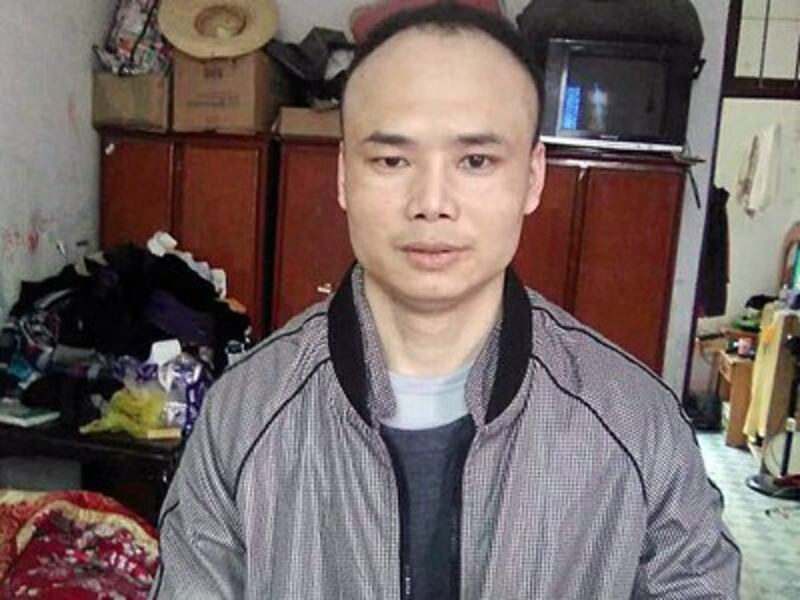The relatives of prominent Chinese rights activist Guo Feixiong have finally managed to visit him in jail, where he is serving a six-year sentence for public order offenses, they told RFA.
Guo, also known by his birth name Yang Maodong, received a visit from his sister Yang Maoping in Yangchun Prison in southern China’s Guangdong Province, where he has been transferred after being sentenced last November for "picking quarrels and stirring up trouble" and "gathering a crowd to disrupt social order."
"He was transferred from the detention center in the Tianhe [district of the provincial capital Guangzhou] on Feb. 20 or thereabouts," Yang said. "The new place is very far away, and there's not much transportation."
"It took me the whole day to get there," she said. "You have to take small roads and paths through the mountains, some of which aren't even finished yet."
She said Guo, 50, is eating slightly better food than he was provided in the detention center, and sleeps in a cell along with more than a dozen other people.
"There are a lot of people in his cell ... and he's not getting much sleep; he barely gets three hours' sleep a night," she said. "He's probably doing worse than he was in the Tianhe Detention Center."
During his sentencing hearing, Guo shouted in protest at his treatment while in police custody, where he was held in solitary confinement in a dark cell and denied permission to exercise outdoors since August 2013, a situation his wife has said is a form of torture.
Health concerns
Yang said there are now serious concerns for Guo's health.
"He told me himself that he is having severe health problems," she said. "I spoke with the guards there and suggested he get a medical checkup, and I have written a letter asking them to perform an abdominal CT scan."
She said health checks carried out at the time of Guo's sentencing were largely superficial.
"His health is very poor, which is the result of being locked up for more than two years," Yang said, adding that there are also concerns that Guo may be vulnerable to further torture or mistreatment.
"The surveillance camera in his cell isn't working, which is very important from a safety point of view," she said. "[My brother's] safety isn't a top priority for others, but it is for his relatives."
"Our family would implode if anything happened to him [in there]," Yang said. "They used to beat him when he was in Meizhou Prison, which was a horrific place."
Fellow activist Yan Xiuying told RFA that Guo is a political prisoner and worthy of public support.
"Of course, [people like him] are prisoners of conscience," Yan said. "If regular folk like us don't support him, then who would we support?"
"That's what the [ruling] Chinese Communist Party is doing now; locking people up, but at least we have the ability to call for their release, because they are our conscience," he said.

Co-defendant released
Meanwhile, Guo's co-defendant Sun Desheng was released on Monday after his time served in pretrial detention was taken into account.
In Guo's case, the prosecution added an extra charge at the last minute, effectively resetting the clock and forcing him to serve the entire six years from scratch.
Sun, who stood trial alongside Guo at Guangzhou's Intermediate People's Court on Nov. 28, 2014, told RFA he is "very angry" about the treatment meted out to Guo, and called for his immediate release.
According to the indictment at the trial, the initial charge against Guo was based on his participation in anti-censorship demonstrations outside the cutting-edge Southern Weekend newspaper offices in Guangzhou in early 2013, where he held up a placard and made a speech in favor of press freedom.
In January 2013, activists, journalists and academics faced off with the authorities after the Southern Weekend newspaper was forced to change a New Year's editorial calling for political reform into a tribute praising Communist Party rule.
Guo's placards called on officials to publicly disclose their assets and for the Chinese government to ratify the International Covenant on Civil and Political Rights, which it signed in 1998.
Last September, Guo's wife Zhang Qing and daughter Yang Tianjiao received the 2015 Front Line Defenders Award for Human Rights Defenders at Risk in Dublin on his behalf.
"Guo Feixiong has defended farmers illegally evicted from their land, Falun Gong practitioners persecuted for their beliefs and journalists who dared to speak out," award presenter Sebastian Barry told the ceremony.
"He is a symbol of the endurance of the human spirit, of the will to survive and of the human need for the free air of ideas, to make life worth living," he said.
Guo is considered at risk because his "memory, speech and mental awareness all showed signs of damage," the statement said, citing Guo's lawyers.
Reported by Yang Fan for RFA's Mandarin Service and by Wen Yuqing for the Cantonese Service. Translated and written in English by Luisetta Mudie.
